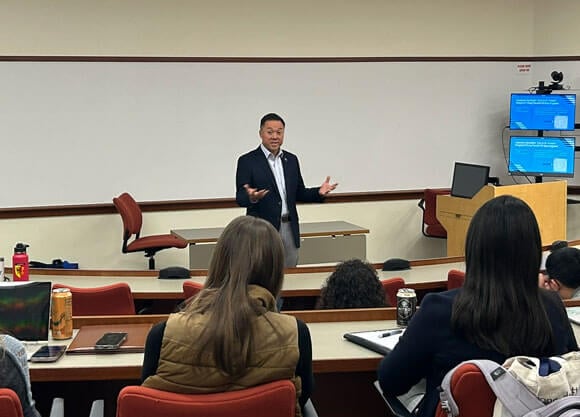
Connecticut Attorney General William Tong inspires Quinnipiac law students
November 14, 2024

November 14, 2024

As the 25th attorney general to serve Connecticut, Tong, a Democrat, was first elected in 2019 and is currently in his second term. Prior to becoming attorney general, Tong served six consecutive terms from 2007 to 2019 as an elected state representative in the Connecticut General Assembly, where he was judiciary committee chair. Prior to that, Tong practiced for 18 years as a litigator in both state and federal courts — first at Simpson Thacher & Bartlett LLP in New York City and then at Finn Dixon & Herling LLP in Stamford, Connecticut.
LaFrance, who currently serves as audubon Connecticut policy director, is a past director of law and policy for environmental conservation at the Connecticut Department of Energy and Environmental Protection (DEEP). Tong praised LaFrance for his depth of expertise and his work which has led to many positive bipartisan legislative accomplishments.
At Quinnipiac, Tong discussed the work of the environment sections and many other sections of his office. Among affirmative work under Tong’s leadership, Connecticut has sued ExxonMobil for its ongoing, systematic disinformation campaign to mislead the public regarding the connection between fossil fuels and climate change.
Discussing his overall role as attorney general, Tong noted that Connecticut, as part of a federation of 50 sovereign states joined together by consent, has delegated limited powers to the federal government.
“This is the source of my authority. The sovereign state of Connecticut gets to decide, by and large, how we the people of this state want to live our lives, and what laws — civil, criminal, regulatory — that we want to enact that govern our lives,” said Tong.
Tong recommended students interested in environmental law review two recent and significant Supreme Court decisions, "West Virginia v. Environmental Protection Agency" (EPA) (2022) and "Loper Bright Enterprises v. Raimondo" (2024).
“It is hard to overstate the tremendous peril that we are facing with respect to environmental protection in this country,” said Tong.
In the West Virginia case, the Court held that the EPA lacks the authority to regulate greenhouse gas emissions, noting such regulation amounted to a “major question” requiring clear authorization from Congress for the EPA to adopt such a policy. The Loper case overturns a 40-year doctrine known as “Chevron deference” which deferred to federal administrative agencies, such as the EPA, when interpreting federal statutes. Under Loper, the courts may determine the correct legal interpretation without such deference.
“I hope you will consider both the Loper and West Virginia cases, which are groundbreaking and not in a good way — and in many ways earth-shattering,” Tong said. “Fundamentally, it changes how this process works and undermines completely the infrastructure of rulemaking.”
Tong also encouraged interested law students from across the School of Law to seek internship opportunities and future legal careers with his office, which is essentially the biggest law firm in Connecticut.
“We have so many different practice areas because we touch all of state government,” Tong said. “If you come to the Office of the Attorney General, there’s a lot to chew on and a lot of different places you can go. You can start in one place and move to another section. You can do defensive work. You can do affirmative work. You can do both.”
Tong outlined what he felt are three of the most important keys to success for future lawyers as they undertake their professional careers.
“I think it’s really important to work on your writing — being able to deliver an argument clearly with concise language that’s direct and not complicated and to be able to unpack an issue in plain language,” Tong advised. “I think it’s really important to be a problem-solver and that’s what the best lawyers do. They think about the problem that their client is confronting or the institution that they represent and they try to get from no to yes. It’s also really important to learn to be a good colleague — to be willing and ready to receive good mentorship, to demand good mentorship and also to be a good mentor.”
Quinnipiac Today is your source for what's happening throughout #BobcatNation. Sign up for our weekly email newsletter to be among the first to know about news, events and members of our Bobcat family who are making a positive difference in our world.
Sign Up Now